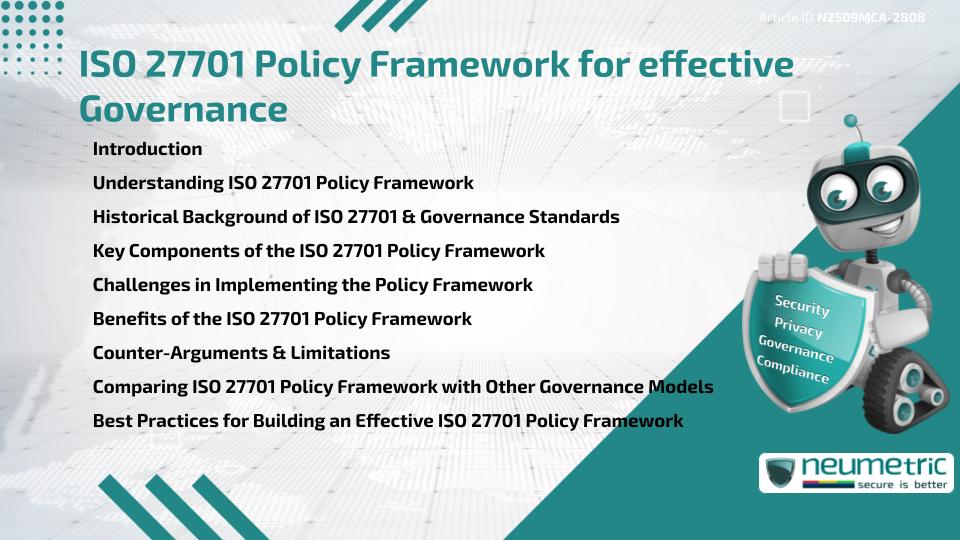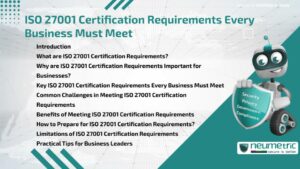Table of Contents
ToggleIntroduction
The ISO 27701 Policy Framework provides Organisations with structured Policies & procedures to achieve effective Governance in managing Personal Data. As an extension of ISO 27001, ISO 27701 focuses on Privacy information management & operationalizing compliance with global regulations like GDPR, CCPA & LGPD. By adopting an ISO 27701 Policy Framework, enterprises can strengthen accountability, ensure transparency & build trust with Stakeholders while aligning Privacy practices with international Standards.
Understanding ISO 27701 Policy Framework
An ISO 27701 Policy Framework refers to the set of documented Policies, procedures & controls that guide how an organisation manages Personal Data under ISO 27701. It defines responsibilities, establishes rules for handling Personal Information & integrates Privacy with Information Security management. This Framework acts as a Governance backbone, ensuring consistency & accountability across the enterprise.
Historical Background of ISO 27701 & Governance Standards
ISO 27701 was introduced in 2019 to address growing global Privacy challenges. It builds upon ISO 27001 & ISO 27002 by extending their focus from security to Privacy. Governance has always been central to ISO Standards, from ISO 9001 in Quality Management to ISO 14001 in environmental management. ISO 27701 continues this tradition by embedding Governance requirements into Privacy management systems.
Key Components of the ISO 27701 Policy Framework
A comprehensive ISO 27701 Policy Framework should include:
- Privacy Policy: Outlining the organisation’s commitment to protecting Personal Data.
- Roles & responsibilities: Defining responsibilities for data controllers, processors & staff.
- Risk Management: Establishing methods for identifying & mitigating Privacy Risks.
- Data Subject Rights procedures: Handling access, rectification, erasure & portability requests.
- Third Party management: Ensuring vendors & partners follow Privacy obligations.
- Incident Response: Creating processes for reporting & managing data breaches.
- Documentation & Audit trails: Recording activities for accountability & compliance audits.
Challenges in Implementing the Policy Framework
Organisations often face challenges in building an ISO 27701 Policy Framework:
- Aligning Policies with multiple overlapping Privacy regulations.
- Resource constraints for developing & maintaining Policies.
- Lack of awareness or training among staff.
- Integration issues with existing Information Security Frameworks.
- Difficulty adapting Policies to global operations with varied legal requirements.
Benefits of the ISO 27701 Policy Framework
Despite challenges, the ISO 27701 Policy Framework provides substantial benefits:
- Ensures compliance with GDPR & other Privacy laws.
- Strengthens accountability through clear Governance structures.
- Reduces Risks of non-compliance penalties & reputational damage.
- Enhances operational efficiency with standardised processes.
- Builds trust with Customers & partners through transparent practices.
- Provides a certifiable structure for demonstrating compliance internationally
Counter-Arguments & Limitations
Some argue that implementing a detailed Policy Framework can be resource-heavy & overly bureaucratic. Others suggest that Policies alone may not prevent Privacy breaches. While these concerns are valid, the ISO 27701 Policy Framework is designed to be scalable & adaptable, ensuring that Governance is practical as well as structured.
Comparing ISO 27701 Policy Framework with Other Governance Models
Other Governance models, such as GDPR accountability principles or the NIST Privacy Framework, provide strong guidance but lack the certifiable nature of ISO 27701. The ISO 27701 Policy Framework is unique in combining Privacy Governance with security management under a globally recognized, certifiable standard, making it valuable for multinational enterprises.
Best Practices for Building an Effective ISO 27701 Policy Framework
Organisations can strengthen their ISO 27701 Policy Framework by:
- Conducting a Gap Analysis to identify missing Policies.
- Involving leadership to ensure Privacy Governance is a top priority.
- Training Employees on Privacy obligations & responsibilities.
- Regularly updating Policies to reflect regulatory & technological changes.
- Integrating the Framework with broader ISMS practices for consistency.
Conclusion
The ISO 27701 Policy Framework equips Organisations with a structured approach to Privacy Governance. By defining Policies, assigning responsibilities & ensuring accountability, enterprises can comply with global Privacy laws, reduce Risks & achieve effective Governance.
Takeaways
- ISO 27701 Policy Framework ensures structured Governance of Personal Data.
- Key components include Privacy Policy, Risk Management, Data Subject Rights & Incident Response.
- Challenges include alignment with Global Laws & resource limitations.
- Benefits include compliance, accountability, efficiency & trust.
FAQ
What is the ISO 27701 Policy Framework?
It is a set of Policies & procedures under ISO 27701 that guide Privacy Governance & Data Protection.
Why is the Policy Framework important?
It ensures compliance with Privacy regulations & provides accountability across the Organisation.
What are the key components of the Framework?
They include Privacy Policies, roles, Risk Management, Third Party controls & Incident Response.
What challenges do Organisations face?
Challenges include aligning with multiple regulations, lack of awareness & integration issues.
How does ISO 27701 differ from other Governance models?
Unlike others, it provides a certifiable, globally recognized Framework integrated with Information Security.
Can small enterprises implement the ISO 27701 Policy Framework?
Yes, the Framework is scalable & adaptable to the size & needs of the Organisation.
References
- ISO – ISO/IEC 27701 Privacy Information Management
- European Commission – GDPR Rights for Citizens
- CNIL – Rights of Individuals
- Council of Europe – Data Protection and Privacy
Need help for Security, Privacy, Governance & VAPT?
Neumetric provides organisations the necessary help to achieve their Cybersecurity, Compliance, Governance, Privacy, Certifications & Pentesting needs.
Organisations & Businesses, specifically those which provide SaaS & AI Solutions in the Fintech, BFSI & other regulated sectors, usually need a Cybersecurity Partner for meeting & maintaining the ongoing Security & Privacy needs & requirements of their Enterprise Clients & Privacy conscious Customers.
SOC 2, ISO 27001, ISO 42001, NIST, HIPAA, HECVAT, EU GDPR are some of the Frameworks that are served by Fusion – a SaaS, multimodular, multitenant, centralised, automated, Cybersecurity & Compliance Management system.
Neumetric also provides Expert Services for technical security which covers VAPT for Web Applications, APIs, iOS & Android Mobile Apps, Security Testing for AWS & other Cloud Environments & Cloud Infrastructure & other similar scopes.
Reach out to us by Email or filling out the Contact Form…





